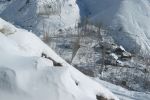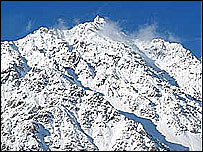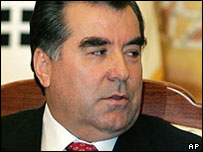News, February 2008
|
Editorial Note: The following news reports are summaries from original sources. They may also include corrections of Arabic names and political terminology. Comments are in parentheses. |
Severe Energy Crisis Leaves Tajikistan on the Verge of a Humanitarian Disaster, Harshest Winter Without Heating or Water, Help Needed
ccun.org, February 8, 2008
A Note from the Editor:
News started to come out of Tajikistan warning of a looming humanitarian disaster if the international community does not provide quick assistance. There is a severe energy crisis leaving the country of about six million people almost without electricity, which is necessary for heating and running water.
Readers find below two reports from people living in the capital Dushanbe, followed by the CARE article, then the BBC article and country profile.
It is beyond belief that all what is needed to avoid the disaster is paying about $4 million energy bill to neighboring Uzbekistan for gas exports.
This serious situation is supposed to alert neighboring countries, EU, US, and Russia to extend their hands with help before it is too late.
When we start to hear news about evacuation of international employees from Dushanbe, it should mean that people will start to freeze to death in Tajikistan soon.
I hope and pray that it doesn't reach to that stage, and some of the mismanaged world resources be diverted to save Tajikistan.
An Update on Potential Energy Crisis:
DUSHANBE, Tajikistan, First
week of February 2008.
The President's Office acknowledges that there will be a prolonged
power shortage. However, the gravity of the situation varies amongst
the several ministries involved and there has been conflicting
information provided to the news media.
I advised on the need to have one Government office, preferably at
presidential level, to issue statements and to meet with donors/UN to
update them on measures taken and on their specific requirements. They
appreciated the need for this and are intending to arrange a briefing
session with donors/UN via the Chair of the Donor Coordination Council.
We offered to organize the meeting in the event the President's Office
was unable to reach the parties concerned.
We received a request for low sulphur residual fuel (Mazud), however it
is crucial to have a second and third expert opinion and we are relying
on the WB energy assessment team to advise on this Monday. We are also
cautioned by an improvement in power supply.
Tajikistan reportedly owed $7 million to Uzbekistan for gas exports. We
were pleased to learn that the Tajik Government paid $3 million of
their debt on 31 January which resulted in a 35% increase in the flow
of gas and
to a significant improvement in the power supply (an increase
of 25% to households in Dushanbe). Gas supplies have also reduced
reliance on electrical power. Electricity imports from Turkmenistan
increased 60% overnight from 2.6 to 6.2 GWh per 24 hours. Kyrgyz
Republic is supplying 0.8 GWh/24 hrs and Uzbekistan provides 2.8
(somewhat below the level that was bilaterally agreed upon). Overall
import levels are being sustained at 9.8 GWh/24hrs. Government has
further reduced power consumption at the
Talco Aluminium factory to 17.1 GWh.
Water levels at the Nurek reservoir stand at 5.71 meters above the dead
zone level. Average +10 temperatures during the past four days has
nearly doubled the inflow rate but this is likely to reduce slightly
with the new cold front commencing today and lasting several days.
Should variables remain constant (e.g. electricity consumption,
production, imports) and if water intake levels at Nurek maintain
their last two week average, then the potential crisis situation will
occur during the first week of March 2008, or nearly three weeks later
than previous forecasts.
By Monday evening, we expect to have the information required to be
more decisive regarding our response as follows: a) debriefing by WB
energy experts; b) results of rapid need assessments; and c)
Government-donor meeting on the energy crisis and humanitarian/economic
implications.
Meanwhile, the UN System has continued preparedness measures aimed at
maintaining its operational capacity in the event of a prolonged power
shortage, and we are identifying sources of fuel, cooking/heating
devices and generators in the event that emergency procurement proves
necessary.
I will revert with additional information as it becomes available and
would encourage others to kindly share with colleagues any info that
comes in.
I propose we meet on Tuesday to review the information available and to
see whether we need to move to a response mode. If so, we would need to
meet as a UN Disaster Management Team (UNDMT) and to also establish a
country Interagency Standing Committee (IASC) which is required for
CERF approval, etc. The latter would include NGOs, and others and could
conceivably be a combination of the REACT mechanism and UNCT. Certainly
there will be a need
to review the entire coordination system in Tajikistan with a few to
making it more streamlined, practical and effective.
Armed incident (exchange of fire) in Gharm, Rasht Valley
At around 11.30 hrs. local time, a group of Special Police Force from
Dushanbe (Ministry of Interior) arrived in Gharm. According to our
Ministry of Interior's Liaison Officer, the group went for a meeting
and some other official business. Having arrived in the Gharm Organized
Crime Control Department's location (in the center of the city, next to
Mayor's Office), they were under fire from personnel of this Department
(the personnel are former United Tajik Opposition combatants who were
incorporated into law enforcement agencies structures following the
Peace Agreement).
Unconfirmed sources informed that Special Police Force from Dushanbe sustained lost of a staff and two others were injured. As for the other side, three were injured. Ministry of Interior of Tajikistan had a phone conversation with the head of Gharm Organized Crime Control Department and demanded that those involved in the shooting be immediately arrested and brought to Dushanbe. Investigation is under way. Ministry of Interior recommends international community to suspend movement to Rasht Valley until further notice.
Severe Energy Crisis Leaves Tajikistan without Heat and Water During the Country's Harshest Winter in 30 Years
CARE to provide emergency supplies to orphans, elderly
 |
In the remote village of Varzob, Tajikistan, heavy snow has rendered roads impassable. Water pipes are frozen and families must walk nearly one kilometer in sub-zero temperatures to the river to fetch water. (2008 CARE)
DUSHANBE, Tajikistan (February 7, 2008) -
A severe energy crisis combined with the harshest winter in 30 years has left millions of people in Tajikistan facing food and fuel shortages, and the situation is expected to worsen in the coming weeks, CARE warns. The same severe weather and heavy snowfall that crippled neighboring China has left parts of Tajikistan, a poor country of just seven million people, without heat or water in temperatures that are dropping to -25°C (-4°F) at night.
"We are already in a food emergency situation. One meal a day is not uncommon, and food prices are rising," said Louis Alexander, Country Director for CARE in Tajikistan. "People usually have three months' food supply in the winter, but now they are down to one month. They are selling their livestock and household assets just to buy enough food to eat and fuel to heat their homes. People are running out of money, and they won't have money to buy seeds for the planting season when spring comes in March or April.
"They are selling their future security just to survive the winter."
CARE is already working to meet the food needs of the most vulnerable people in Tajikistan, distributing food to 12,000 students and 4,400 pregnant and lactating women as part of a multi-agency food distribution program. In response to the current crisis, CARE is preparing to distribute additional food, heating stoves, coal, blankets and other emergency supplies to more than 6,000 extremely vulnerable people such as orphans and the elderly, and provide basic health services through mobile health clinics to remote communities. CARE is appealing for additional funds to expand the emergency response in the coming days.
"Elderly people living alone with little or no income are helpless victims of this crisis situation," added Alexander.
Tajikistan usually suffers electricity shortages in the winter, but record-low water levels in the reservoir that feed the country's main hydroelectric system have made the situation worse. Many rural areas have access to just one or two hours of electricity a day. Even in the nation's capital, Dushanbe, electricity is limited, leaving urban residents without power to heat their homes.
Heavy snowfall has blocked roads in some areas, cutting off or slowing access to critical medical services and markets. Water pipes have frozen solid, leaving many people without access to water.
"We are preparing for the worst-case scenario," said Alexander. "It's expected that the water level in the reservoir will reach a critical point by mid-February, which will reduce the electricity supply to the country by nearly half."
The government of Tajikistan has appealed for international aid. CARE is coordinating closely with other aid groups and local governments to respond to the crisis.
Media Contacts:
Bangkok, Thailand: Melanie Brooks, CARE USA, mbrooks@care.org, +66 2 204 2561, +66 81 915 8108
Tajikistan 'facing catastrophe'
by Natalia Antelava BBC News,
Dushanbe 23 January, 2008
The deteriorating food situation is part of the energy crisis which hit the mountainous nation in the middle of its coldest winter for five decades.
The cost of food has tripled in recent months, partially because of rising world prices.
Some humanitarian agencies claim Central Asia's poorest nation is heading towards catastrophe.
It's well below zero in Tajikistan, but most people have no electricity, no heating and now, increasingly, many don't have enough food either.
One family in the village of Sagdyan, outside the capital Dushanbe, said their four children were surviving on milk and rice. Their next door neighbours could not afford even that.
One meal a day
Zlatan Milisic, the country director for the World Food Programme in Tajikistan, says it's not just the rural population that's being affected, but people in the cities too.
"We are seeing more and more people who are eating just one meal a day. And we only expect the food situation to deteriorate. This is already a real emergency," said Mr Milisic.
He added additional funding was urgently needed to assist the people.
Even at the best of times, tens of thousands of people are malnourished.
But this winter is affecting a huge proportion of the population. People are spending all they have on trying to keep warm.
And the worst is still to come - Tajikistan is currently using up its last energy resources, and it may face a total blackout.
Tajikistan: A Country Profile
BBC, January 23, 2008
A former Soviet republic, Tajikistan plunged into civil war almost as soon as it became independent from the Soviet Union in 1991.
A rugged, mountainous country, with lush valleys to the south and north, it now faces the challenge of strengthening peace and reviving its ruined economy.
Nearly half of Tajikistan's population is under 14 years of age. Tajiks are the largest ethnic group, with Uzbeks making up a quarter of the population, over half of which is employed in agriculture and just one-fifth in industry.

The Tajik language is very close to Persian, spoken in Iran, and to Dari, spoken in Afghanistan.
The five-year civil war between the Moscow-backed government and the Islamist-led opposition, in which up to 50,000 people were killed and over one-tenth of the population fled the country, ended in 1997 with a United Nations-brokered peace agreement.
Tajikistan has been accused by its neighbours of tolerating the presence of training camps for Islamist rebels on its territory, an accusation which it has strongly denied.
The republic has relied heavily on Russian assistance to counter continuing security problems and cope with the dire economic situation. Russian forces guarded sections of the border with Afghanistan until mid-2005 when their withdrawal was completed and the task handed over to Tajik border guards.
Skirmishes with drug smugglers crossing illegally from Afghanistan occur regularly, as Tajikistan is the first stop on the drugs route from there to Russia and the West.
In October 2004 Russia formally opened a military base in Dushanbe where several thousand troops will be stationed. It also took back control over a former Soviet space monitoring centre at Nurek. These developments were widely seen as a sign of Russia's wish to counter increased US influence in Central Asia.
- Population: 6.3 million (UN, 2005)
- Capital: Dushanbe
- Area: 143,100 sq km (55,251 sq miles)
- Major languages: Tajik, Uzbek, Russian
- Major religion: Islam
- Life expectancy: 61 years (men), 66 years (women) (UN)
- Monetary unit: 1 Tajik somoni = 100 dirams
- Main exports: Aluminium, electricity, cotton, fruit, textiles
- GNI per capita: US $330 (World Bank, 2006)
- Internet domain: .tj
- International dialling code: +992
President: Emomali Sharipovich Rakhmon (Rakhmonov)
Emomali Rakhmon, a former cotton farm boss, was elected chairman of the Supreme Council of Tajikistan in 1992 after the country's first post-Soviet leader, Rahmon Nabiyev, was forced to resign.

He was elected president in 1994 and re-elected in 1999 when his term was extended to seven years.
In 2006 he won a third term in office in an election which international observers said was neither free nor fair. Opposition parties boycotted the vote, dismissing it as a Soviet-style staged attempt at democracy.
Mr Rakhmon was instrumental in the pro-Communist effort to remove Islamist rebels from Dushanbe in the early 1990s. He led troops from southern Kulob District and supported the intervention of forces from other former Soviet republics. After years of civil war and violence, some stability returned to Tajikistan.
The president is not known for tolerating dissent. His People's Democratic Party holds virtually all seats in parliament. Western observers said the 2005 legislative elections had failed to meet international standards.
Mr Rakhmon does retain substantial public support. Tajikistan is still very poor, but many people are thankful they no longer have to face the civil war of the 1990s which killed tens of thousands and caused more than 10% of the population to flee the country.
Mr Rakhmon was born in 1952. His surname was Rakhmonov until 2007 when he ordered his countrymen to drop Russian-style surnames, in a break with the nation's Soviet past. He removed the Russian suffix "-ov" from his surname, saying this made him sound more Tajik.
Broadcasting is dominated by state-run radio and TV. More than 30 local and regional private TV stations are on the air, most of them entertainment-based.
There are more than 200 registered papers, some of them government-owned and others linked to political movements.
A few private radio stations operate alongside state-run radio. Dushanbe's first private station opened in September 2002, after a four-year wait for its licence.
Media rights organisations report that, although provided for in the constitution, press freedom is not widely respected in Tajikistan.
Reporters Without Borders notes that independent journalists come under great pressure from the authorities, who also control printing plants and determine the editorial line of the state-owned media.
A government minister estimated in 2007 that more than one million Tajiks had access to the internet.
The press
Television
Radio
News agencies
Fair Use Notice
This site contains copyrighted material the use of which has not always been specifically authorized by the copyright owner. We are making such material available in our efforts to advance understanding of environmental, political, human rights, economic, democracy, scientific, and social justice issues, etc. We believe this constitutes a 'fair use' of any such copyrighted material as provided for in section 107 of the US Copyright Law. In accordance with Title 17 U.S.C. Section 107, the material on this site is distributed without profit to those who have expressed a prior interest in receiving the included information for research and educational purposes. For more information go to: http://www.law.cornell.edu/uscode/17/107.shtml. If you wish to use copyrighted material from this site for purposes of your own that go beyond 'fair use', you must obtain permission from the copyright owner.
|
|
|
|
||
|
||||||


